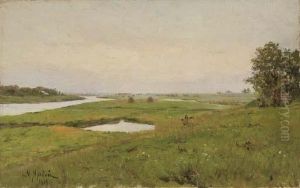Iarovoi Mikhail Miklailovich Paintings
Mikhail Mikhailovich Yarovoi was a notable Soviet writer and journalist, born in 1896. His life and work were deeply intertwined with the turbulent history of the early 20th century, reflecting the dramatic shifts in society, politics, and culture that characterized the era. Yarovoi's literary career was significantly influenced by the Russian Revolution and the subsequent establishment of the Soviet Union, events that shaped not only his thematic concerns but also his personal trajectory.
Yarovoi began his career in the arts during a period of immense change, and his works often mirrored the socialist realism style, a state-promoted art movement that sought to elevate the everyday lives of workers and peasants within the context of the socialist state. Throughout his career, he was tasked with navigating the complex interplay between artistic expression and the political directives of the time, often focusing on themes of social justice, collective effort, and the human experience within the Soviet framework.
Despite the constraints imposed by the state, Yarovoi's contributions to Soviet literature and journalism were significant. His writings not only offered insights into the ideals and challenges of Soviet society but also served to document the era's historical and cultural shifts. His ability to convey deep human emotions and the realities of life in the USSR earned him recognition among his contemporaries and later generations.
Mikhail Mikhailovich Yarovoi's death in 1954 marked the end of a career that had navigated through some of the most defining moments of 20th-century Soviet history. His legacy, however, continues to be of interest to scholars and readers alike who seek to understand the complexities of Soviet art and literature, and the ways in which it reflected and shaped the experiences of those living through the era's monumental changes.
